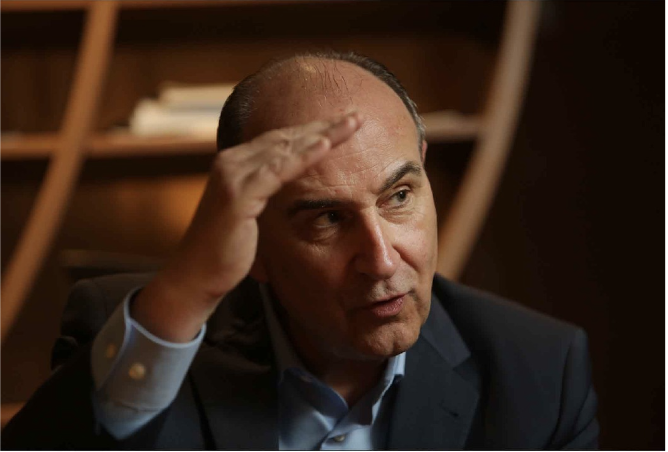The role of a chief executive officer (CEO) is unlike any other in an organization. It is the ultimate position of accountability, and every decision carries immense weight, affecting employees, shareholders, customers, and the company’s long-term success.
A CEO must possess extraordinary business acumen, strategic intelligence, and operational expertise, as well as deep self-awareness, emotional intelligence, and a rock-solid character. Without these, even the most skilled CEO will struggle to inspire, build trust, and navigate the complexities of leadership with resilience and integrity.
To reach the CEO level, one must already be highly skilled, but leadership is not a static destination—it is a continuous journey. Growth is not optional; it is essential. Just as companies must innovate and evolve to stay competitive, leaders must commit to relentless self-improvement. Without it, stagnation sets in and is the first step toward decline.
A CEO’s success is not just about making smart choices but about making the right choices, often in moments of uncertainty, crisis, or high stakes. And that requires more than intelligence—wisdom, courage, resilience, and the ability to navigate complexity with clarity and conviction.
This is where CEO coaching becomes invaluable. A CEO coach is an executive coach with the expertise to work with the head of the organization. This person can potentially make the most significant difference in the organization’s success and the lives and careers of its employees by empowering leaders to perform at their highest level—with clarity, confidence, and strategic foresight.
What is a CEO Coach?
CEO coaches work closely with top executives, helping them operate from a foundation of self-awareness, emotional intelligence, and strong character while mastering the external skills required for execution, decision-making, and influence.
A CEO coach helps the top business leaders:
- Refine their leadership presence to inspire and engage their teams.
- Sharpen their decision-making in high-pressure, high-stakes situations.
- Strengthen resilience and adaptability to navigate uncertainty and change.
- Enhance emotional intelligence and self-awareness to build trust and strong relationships.
- Create a leadership legacy that extends we beyond their tenure and positively impacts the organization for years to come.
Great leadership starts from within. A CEO coach helps executives uncover blind spots, break through self-imposed limitations, and cultivate a mindset that fuels sustained success.
As we will see later in the article, even the best leaders in the world didn’t reach the top alone—they embraced coaching as a strategic tool to maximize their potential and drive transformative impact.
Sustained excellence demands continuous refinement of both inner and outer leadership dimensions, and CEO coaching is the most powerful catalyst for this transformation.
Even Top CEOs Need a Coach
Any professional can benefit from the services of a coach. After all, a coach’s job is to observe, assist, and generally help the person being coached to elevate their performance – sometimes in general and other times in highly specific ways.
For the same reason that opera singers work with voice coaches and Olympic-caliber athletes at the peak of their careers work with training coaches, a CEO works with a coach in a CEO coaching relationship to improve his leadership skills.
That reason is to become the best and most effective CEO they can be.
Coaching Results Must Be Measurable
Companies operate with finite resources, and every investment—whether in technology, talent, or strategy—is made with the expectation of driving long-term growth. Coaching is no different. It is not a vague or optional exercise; it must deliver real, measurable value contributing to the CEO’s effectiveness and, ultimately, the company’s success.
The CEO who works with a coach in an executive coaching context does so with the expectation of a measurable return on investment (ROI). Spending time with an experienced, exceptional CEO coach must get actual, observable, measurable results.
Some results are immediately evident, while others take time to unfold. Ultimately, the effectively coached CEO can expect to perform better and sustain results over the long term.
In other words, working with an executive coach or a CEO coach must be an investment that makes smart business sense.
Measuring Progress of Executive Coaching
Tracking progress in executive coaching is essential to ensuring real, measurable growth. Effective coaching isn’t just about gaining insights—it’s about creating tangible improvements in leadership behavior and decision-making.
This progress can be evaluated objectively and subjectively using real-world leadership challenges, structured assessments, and reflective discussions between the coach and client.
Meaningful Results
Progress should be measured in ways that are meaningful to the client. Different types of progress can often be marked differently. Progress may sometimes be “measured” simply by discussing it with the coach.
Suppose a CEO has difficulty delegating without tending toward micromanagement. One goal may be to delegate a specific task completely (say, production of a weekly report) and trust the team management to take care of it rather than butting in and constantly checking that everyone’s doing what they’re supposed to do.
If the CEO accomplishes this and the report is written to everyone’s satisfaction, the CEO and coach may discuss it.
- How much time was freed up by delegating effectively?
- Were there any feelings of diminishing authority?
- What benefits were experienced as a result of delegating effectively?
The client or coach may note this type of progress or both to be reviewed later.
Assessment Tools
Another way coaches and clients may measure progress is by repeating assessment tools at the end of the coaching contract.
- How has the client changed throughout the relationship?
- Where is there still progress to be made?
Both objective and subjective measures of progress are essential for the maximum success of the coaching relationship.
The Changing Perception of CEO Coaching
CEO coaching has matured, become more objective and measurable, and entered the mainstream of today’s business world. It is no longer seen as a desperate act to “save” a faltering CEO. Today, a CEO coach is often employed early in a new CEO’s tenure so that the company will thrive under their leadership as soon as possible.
The concept of “needing” an executive coach when being one of the senior executives has not always been positive. Coaches in various forms, of course, have been around for more than a century. Still, in the early days of executive coaching, it was almost seen as a remedial process – something a company would resort to when they invested in a CEO who was either wrong for the job or clearly out of their depth.
A leader who warranted the services of a coach probably didn’t advertise that fact. All of that has changed now that individuals and organizations can see the immense positive effects that executive coaches can have.
Today, that perception has shifted entirely. Executive coaching is now regarded as a strategic advantage, a tool that helps high-performing leaders refine their skills, expand their self-awareness, and unlock even greater levels of impact.
The thinking now is more like, “We’re investing in this person with great bona fides and tremendous promise. Hiring a CEO coach to help the CEO with his personal growth and executive leadership skills will help ensure this investment pays off for everyone.”
The goal of any great coach is sustained excellence.
Do I need a CEO coach?
Nowadays, having a coach is a sign that someone intends to keep moving upward. Eric Schmidt, Steve Bennett, Oprah Winfrey, Steve Jobs, and Barack Obama are all professionals at the top of their game who saw the wisdom in working with a coach.
As a result, more companies and executive team members are working with coaches, and they’re not secretive about it. If Usain Bolt, the fastest man in the world, works with a sprinting coach, why wouldn’t those considered at the top of their profession also work with specialized coaches?
The coach is there to ensure the CEO is as effective as possible, as quickly as possible.
If you and your organization are committed to growth, continuous development, and becoming the absolute best you can be, then investing in executive coaching is the right choice. CEO coaching will help you refine your leadership, strengthen your organization, and ensure that you’re not just running a company but building an endured legacy.
Ensuring Quality CEO Coaching in a Crowded Market
Not all changes to the leadership coaching world have been positive, however. The rise in coaches’ popularity has been accompanied by a rise in the number of people who declare themselves coaches, hang out a shingle, and fail to deliver the expected results.
Part of that is because nothing stops the person who wants to call themselves a coach and try to get clients. However, the people interested in hiring coaches are gaining more resources they can use to separate the genuinely qualified and talented coaches who developed an effective CEO coaching program that can make a meaningful impact on the leadership team dynamics from hacks without the necessary competencies.
Organizations like the International Coach Federation (ICF) offer certifications for coaches and accreditation for coach training programs, reassuring clients that the coaches they hire have been properly and sufficiently trained.
Does certification guarantee that a coach will be effective?
No, but it makes it more likely that a coach is who they say they are and has received high-quality, established training.
How to Select a CEO Coach
Selecting a CEO coach requires much more than reviewing a list and seeing who is available. There needs to be a good fit between coach and client, and this is hard to gauge from a web page. In addition to checking a potential coach’s credentials, learning something of their track record and communicating directly with them to see if the relationship appears fruitful is essential.
Work Experience
Selecting a coach with significant work and life experience is essential, particularly for a CEO. CEO coaches who have been CEOs themselves may be a good choice. Regardless of whether the coach has been a CEO, they should have the experience to know what it’s like to hire and fire people and generally ensure a business remains operational and profitable.
Methodology
Any CEO coach should be prepared to describe their methodology, assessment tools, and how they plan to measure success. Likewise, they should be strong enough to hold the CEO accountable for the work involved in a productive coach-client relationship. They should also be prepared to determine where skills gaps lie, where there is room for improvement and specific techniques for overcoming deficiencies and measuring progress.
Different CEO coaches have different methods for assessing baseline measurements and skills gaps.
Accountability
Finally, a great CEO coach isn’t afraid to call out the client when they are neglectful, lazy, acting out, or generally not participating in the coaching process. A coach is not a drinking buddy or a shoulder to cry on but a willing and capable partner in measurable performance improvement.
Maximizing Effectiveness
The coach’s role is not to train a CEO to be a CEO because they should already know what’s expected of them. What the CEO coach can do, however, is help the CEO become more effective, waste less time, communicate better, and set the stage for a lasting, positive legacy.
Studies have shown that investing in CEO coaching also pays off on the bottom line.
How CEOs and Businesses Benefit from CEO Coaching
Better self-awareness and self-regulation are two of the most essential benefits of CEO coaching, affecting the CEO individually and the overall organization. The CEO who is aware of their tendencies, proclivities, strengths, and weaknesses is a CEO who is prepared to tailor their actions and thought processes accordingly.
Self-awareness and self-regulation are critical components of emotional intelligence, facilitating effective communication.
Yet, it may be lacking in people at the top of the leadership chart. Emotionally intelligent people are more transparent, honest, and easy to talk to, and this simple fact can reduce the stress of interactions between CEOs and the people who work for and with them.
Coaching helps CEOs develop better habits, address skill gaps, and build emotional intelligence. It can also help them understand how others view them and how their words and actions affect them.
To an extent, direct reports and others are expected to accommodate some of the peculiarities of the gifted CEO, but that doesn’t mean a CEO can act as they please at all times without expecting it to affect others (and ultimately the company).
CEO coaches can be tremendously effective in helping CEOs learn how others regard them and how their actions and words affect the people they interact with.
Examples of CEOs Who Tout the Benefits of CEO Coaching
The world’s most successful CEOs don’t just rely on their intelligence, experience, or business acumen—they invest in coaching to continually grow, refine their leadership, and maximize their impact.
Many of today’s most recognized business leaders attribute their success, at least partly, to the guidance of mentors and executive coaches.
1. Stephen Bennett (Symantec)
Stephen Bennett has served as President and CEO of Symantec and spent seven years at the top of Intuit as CEO. While he was at Intuit, the company’s annual revenue increased from $1 billion to $2.7 billion. Bennett has long understood the value of coaching, particularly for the highest achievers in business, saying, “At the end of the day, people who are high achievers—who want to continue to learn and grow and be effective—need coaching.”
2. George Trow (Doncaster College)
Principal and CEO George Trow of Doncaster College in the UK used coaching for himself and 70 of his managers upon being appointed to the post.
His goal was to install a coaching culture, and the results were impressive. Not only did the student success rate increase dramatically, but the school’s finances also recovered from being “poorly functioning” to being stellar.
3. Mary Barra (General Motors)
Mary Barra, an engineer who transitioned to HR and ultimately to the CEO office of General Motors, credits the many mentors she has had over her career with helping her reach the top of a major American corporation.
She has often asserted that coaches make a positive difference and is viewed as “the consummate coach.”
4. Indra Nooyi (PepsiCo)
PepsiCo Chair and CEO Indra Nooyi was once awarded UCLA Anderson School of Management’s John Wooden Global Leadership Award based on her ability to embody the ideals of Coach Wooden, the most successful coach in men’s college basketball. She also touts the benefits of coaching in helping women scale the corporate ranks, telling Good Housekeeping, “Women helping each other — coaching, mentoring, and providing tips — is a great way for us to be our own force.”
I have had the privilege myself of coaching Steve Jobs (Apple), the former Chairman and CEO of PepsiCo, Roger Enrico, the CEO of Nielsen Mexico, Armando Uriegas, the former CEO of FedEx, Bill Logue, the Prime Minister of the UAE and his top team, the CEO of Oman LNG, Harib Al Kitani, and many other top CEO’s and government officials, all of whom fully embraced the experience of working in partnership with me.
While we have made positive strides in CEO coaching, most CEOs and government leaders who could benefit from coaching have yet to seize the opportunity to work with a coach. The good news is that this is changing, and it will continue to change as more CEOs work with coaches in the future.
Some of industry’s leading CEOs extol the benefits of working with a coach.
Why CEO Coaches Have Gained Popularity
The primary reason executive coaching relationships have become more prevalent is that they yield positive results.
The CEO sets the tone for the workplace culture, whether for good or ill. Coaches understand this, and they strive to help CEOs develop their self-awareness so they can see how they affect their company’s culture
While many benefits of effective CEO coaching are subjective (like making the organization a “better place to work”), many can be quantified. One American Management Association study concluded that organizations that used coaching had stronger market performance.
A survey of coaching clients by PriceWaterhouseCoopers found that the average ROI for companies that invested in coaching was seven times their initial investment. Over one-quarter of survey participants reported ROIs of 10 to 49 times the initial investment!
The reason for such an impressive ROI involves CEOs learning to “walk the talk,” inspiring people to listen, and spreading their enthusiasm far and wide.
Trust and team effectiveness also increase throughout organizations that engage in coaching.
CEO Coaching: Driving Leadership Development and Business Forward
So, what exactly happens if I am a CEO or have appointed the next CEO and hired a CEO coach?
A CEO coaching program aims to enhance leadership development and move the business forward by refining decision-making, strengthening self-awareness, and optimizing leadership impact.
But coaching isn’t a one-size-fits-all approach. It’s a structured yet personalized process designed to help CEOs reach their full potential while driving organizational success.
Having a Clear Plan of Action
First, it’s important to note that while CEO coaches must be flexible and adaptable, one thing they don’t do is “wing it.” The most effective CEO coaches have developed clear processes and methodologies that inform the direction of coaching sessions, yet they have also personalized their services to the client.
Gathering Information
Often, the coaching relationship begins with direct observation. A coach may shadow a client in action and make notes. Many coaches also use in-depth assessment tools, such as the Mattone Leadership Enneagram Inventory (MLEI) or the Mattone Strategic-Tactical Leadership Index (STLI-360), to help identify a client’s greatest strengths and gaps.
Great coaches talk and listen to the client, their perspectives, and their direct reports. They want to start with a comprehensive, 360-degree view of their client so they can tailor services accordingly.
Gathering comprehensive information on the client is one of the first tasks of the CEO coach.
Identify Goals
After the initial assessment and discussion with the client, the coach and client set goals and specific objectives to achieve those goals. They establish a timeline and create a tailored set of metrics for regularly assessing progress.
Coaches might assign the client “homework” and spend individual, in-person time with the client at the start of the coaching agreement.
With goals and a workable plan established, coaches typically determine a schedule for regularly meeting with clients, whether by phone, teleconference, in person, or other means. During the time between meetings, the client is expected to work on achieving specified goals and objectives, and future meetings may be spent reviewing those accomplishments.
Evaluation
When the coaching contract ends, the coach and client evaluate progress and may develop a plan for maintaining momentum after the coach has left. Some coaching clients include periodic follow-ups after the intensive part of coaching.
Conclusion: The Power of CEO Coaching
CEO coaching is not about teaching leaders how to do their job—it’s about helping them do it better, faster, and with greater impact. It strengthens decision-making, sharpens leadership presence, and ensures that a CEO’s influence extends beyond their tenure. Companies that invest in CEO coaching don’t just develop stronger leaders; they build cultures of excellence, innovation, and long-term success
The CEO coach is becoming an increasingly important resource for companies that want to excel in an ultra-competitive business environment. Much is expected from today’s CEO, and while many of them are highly competent and experienced individuals, that doesn’t eliminate the learning curve of orchestrating an entire business’s operations.
The role of a CEO is one of immense responsibility, influence, and complexity. Even the most seasoned executives recognize that sustained success requires continuous growth, self-awareness, and strategic refinement. That’s exactly what CEO coaching delivers. The best leaders in the world, from Steve Jobs to Indra Nooyi, have embraced coaching not as a sign of weakness but as a powerful tool for maximizing their effectiveness and driving their organizations forward.
If you’re committed to continuous growth, elevating your leadership, and building a legacy of lasting success, investing in CEO coaching is the next step. If you are ready to unlock your full potential and drive lasting organizational success, schedule a free discovery session with John Mattone Global today.
Frequently Asked Questions
1. How is CEO coaching different from executive coaching?
While all CEO coaches are executive coaches, not all executive coaches specialize in CEOs. A CEO coach works exclusively with the top leader of an organization, focusing on the unique challenges of ultimate accountability, driving culture, navigating complexity, and sustaining legacy.
2. Is CEO coaching only for struggling leaders?
No. The old perception of coaching as “remedial” has shifted. Today, coaching is recognized as a strategic investment that helps high-performing CEOs sharpen their inner and outer core, strengthen decision-making, and lead with greater clarity and impact.
3. What measurable benefits can organizations expect from CEO coaching?
Beyond improved culture and trust, studies show impressive ROI. Research by PricewaterhouseCoopers found that companies investing in coaching achieved an average return of seven times their initial investment, with some reporting returns up to 49 times.











